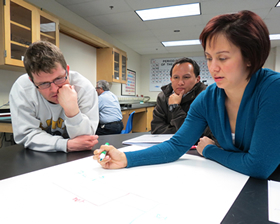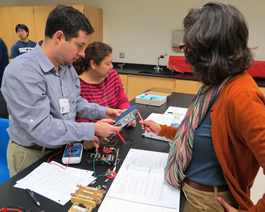Two-Year College New Faculty Experience
What you'll learn and use in our full-immersion workshops
Microcomputer-Based Laboratory (MBL)...
...tools coupled with an activity-based physics approach provides a better method of teaching physics by enabling the teaching/learning process to build on students’ direct experiences in the physics classroom/laboratory or studio. As recent PER data indicates these MBL tools give students immediate feedback by presenting data graphically in a manner that can be easily and quickly understood. The ease of data collection and presentation afforded by these tools invites students to ask, discuss, and answer their own questions. Thus, students acquire an increased competence in the use and interpretation of graphs as well as a better understanding of the physical relationships, principles, and concepts that underlie their experiences. In this hands-on workshop, participants will work in areas involving force, one-dimensional linear motion, rotation, sound, heat, electricity, magnetism, nuclear radiation, and light.
The ICP/21 curriculum...
...was written with the technical (engineering and medical) student in mind. Each participant will work through selected modules in this curricula that was developed by a group of two-year college physics professors. Each ICP/21 module uses a series of learning cycles and incorporates many of the teaching techniques, developed by others, that are based on physics education research. Throughout the problem sets and examples in the modules, ICP/21 uses applications found in industry and medicine. The modular CD curriculum allows TYC instructors the opportunity to choose several modules from the curricula that are particularly germane for their students. Each module is activity-based and utilizes a variety of tools to better motivate the student in the learning of key physics concepts.
The Instructional Strategies in Introductory Physics...
....presents ways that instructors can approach teaching physics. Participants will learn selected strategies and practice applying them to physical situations. Essential to creating a useful strategy is to have quality-modeling tools. As physicists we have been exposed to numerous modeling tools (equations, free-body diagrams, motion diagrams, etc.). This workshop will introduce new modeling tools and demonstrate how to use existing tools in more robust ways. Another essential component of these strategies is classroom management. Participants will experience a classroom management technique called modeling discourse management. While this classroom management style was created for a modeling curriculum, it can also be used with most PER based activities or curriculum. Modeling discourse management is an attempt to improve student-student interactions, student-instructor interactions, and classroom discussions.

